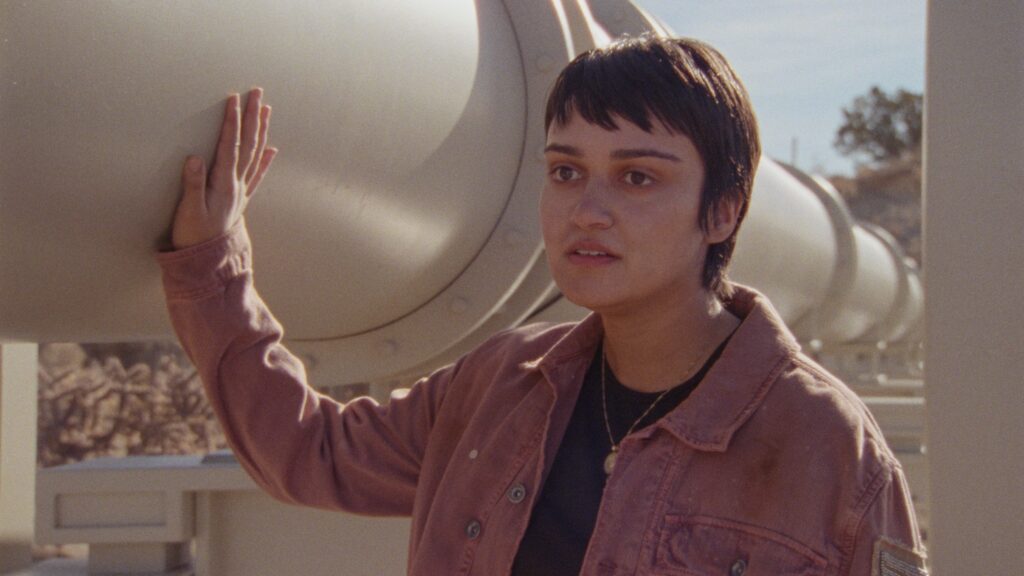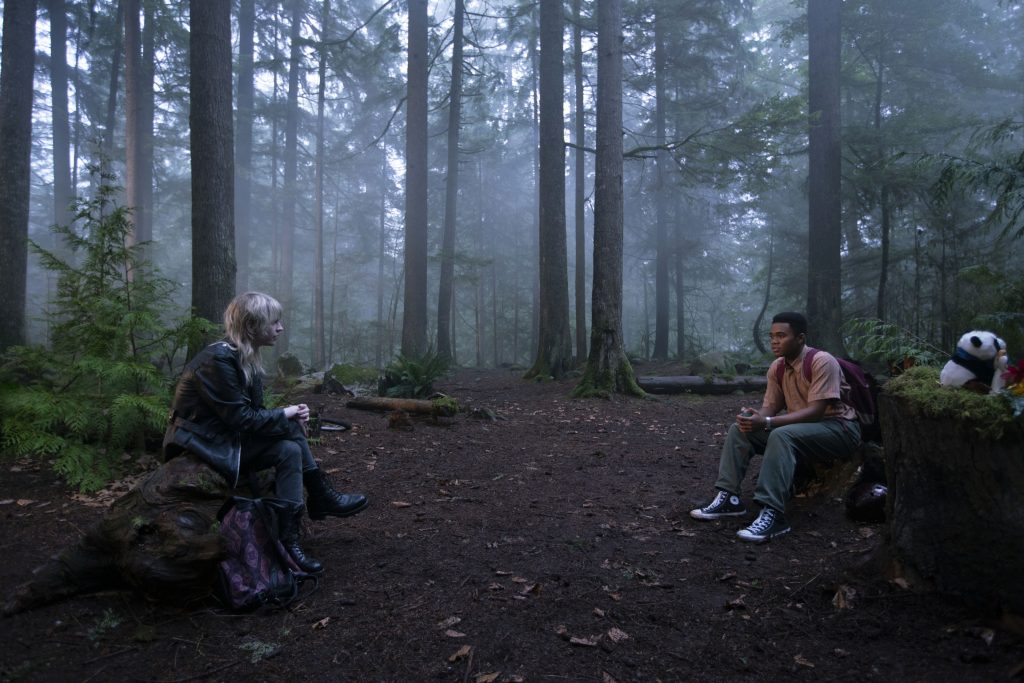April 16, 2023
by Carla Hay

Directed by Daniel Goldhaber
Culture Representation: Taking place in Texas, California, and North Dakota, mostly in December 2023, the dramatic film “How to Blow Up a Pipeline” features a racially diverse cast of characters (African American, white, Latino and Native American) representing the working-class and middle-class.
Culture Clash: A group of eight radical environmentalists go to Texas to carry out their plan to blow up a major oil pipeline.
Culture Audience: “How to Blow Up a Pipeline” will appeal primarily to people who are interested in environmental causes, but the movie has mixed messages about how violence can play a role in extreme activism, and the story somewhat glosses over racism problems.

“How to Blow Up a Pipeline” might as well have the words “made by well-meaning and privileged political liberals” in the description of this movie. It’s a gripping and well-acted drama about a group of extreme environmentalists. However, there are some glaring plot holes, and the film mishandles some racism issues. “How to Blow Up a Pipeline” had its world premiere at the 2022 Toronto International Film Festival.
Directed by Daniel Goldhaber, “How to Blow Up a Pipeline” was co-written by Goldhaber, Ariela Barer (who’s one of the stars of the film) and Jordan Sjol. The story has plenty of suspense and makes great use of flashbacks to fill in the blanks in most of the characters’ backstories. However, viewers with enough life experience who watch this movie won’t be able to shake the feeling that the “How to Blow Up a Pipeline” filmmakers thought that it would be cool to make a movie about a serious subject matter (committing violence in the name of extreme activism) without really doing enough research into the subculture of violent, radical activists.
It’s the same feeling that came from the 2018 erotic drama “Cam,” Goldhaber’s feature-film directorial debut about a young woman who works as a porn webcam performer. There was a lot of interesting dialogue in “Cam,” but the movie didn’t come across as completely realistic or authentic, even though it wanted to be. “Cam” was also a very “male gaze” film, even though “Cam” was supposed to be told from the perspective of a female protagonist.
“How to Blow Up a Pipeline” is not a documentary, and the movie’s fictional characters are not based on any particular real people. However, the movie is based on Andreas Malm’s 2020 non-fiction book “How to Blow Up a Pipeline,” which advocates for property destruction as a way to get attention for activist causes. The obvious intention of the movie was to have a tone of realism, in order to make this a thought-provoking film. It succeeds in many areas, but it other areas, “How to Blow Up a Pipeline” falls very short.
Most of “How to Blow Up Your Pipeline” switches back and forth between two types of scenes: (1) the planned December 2023 bombing of a major oil pipeline, somewhere in west Texas and (2) flashbacks that reveal the lives and motivations of the eight young people who have planned this bombing. The last 15 minutes of the movie show the aftermath of this plan.
The eight people in this racially diverse group of bombers consider themselves to be extreme environmentalists, although at least two of them don’t really seem to care that much about environmental causes and just want to cause some mischief. The bombers’ ages range from mid-20s to early 30s. And they have all agreed in advance that they will rig the bomb so that no one could possibly get killed or physically injured. (And as soon as someone says in the movie that no one will get physically hurt, you just know that at least one person will get physically hurt.)
The bombers’ intent is to disrupt the fossil fuel production that comes from this major pipeline. They don’t have a name for their group. They want this bombing to be an anonymous statement against fossil fuel production. In fact, the way these these eight people found each other to form this loose-knit group looks a little too “only in a movie” rushed. Three of the group members didn’t know anyone else in the group before this plan, so these three people are the ones that are essentially the “strangers” to the other people.
The eight people in this group are:
- Xochitl “Xochi” Fuentes (played by Barer) is the mastermind of this bombing. She came up with the idea and is the one most responsible for bringing this group together. Xochi (pronounced “soh-shee”) lives in Long Beach, California, and is grieving over the recent death of her mother, who raised Xochi as a single parent.
- Theo (played by Sasha Lane) is Xochi’s best friend since childhood. Theo and Xochi, who both live in Long Beach, consider each other to be almost like sisters, since Theo (who came from a broken home) mentions in the story (after Xochi’s mother has died) that Xochi’s mother was like a mother to Theo.
- Alisha (played by Jayme Lawson) is Theo’s girlfriend. They both work as house cleaners. Alisha is initially the one who’s the most reluctant to participate in this bombing plan.
- Rowan (played by Kristine Froseth) is a meth-snorting party girl who is homeless and always ready for any type of mischief-making.
- Logan (played by Lukas Gage), Rowan’s drug-using boyfriend, is also homeless and is even more reckless than Rowan. They both live in motels and in Logan’s car in the Long Beach area.
- Shawn (played by Marcus Scribner) is a former college student who became disillusioned with mainstream environmental activism because he thinks it’s not effective enough. He currently lives in the Long Beach area.
- Dwayne (played by Jake Weary) is an unemployed husband who is bitter because he lost his home, is financially broke, and is now living with his wife at her parents’ home in Odessa, Texas.
- Michael (played by Forrest Goodluck) is a scowling introvert who is angry about what pipelines have done to his Native American community in Parshall, North Dakota.
Michael is the one who is in charge of planning the chemical concoctions to make the bomb. Michael is a “chemistry nerd” who has done extensive research on how to make bombs. He even films social media videos on how to make homemade bombs. He does videos and livestreams on a YouTube-like channel called Boom Talk.
Michael also gets help from Shawn in making the bomb’s chemical concoctions, although Michael is a control freak who would prefer that no one else get near the chemicals, for their own safety. Shawn (who is African American) and Michael construct the actual bomb. Observant viewers will notice that the people of color in this group are the ones who do most of the work and put themselves in the most physical danger in the bombing plans.
There are overt signs of racism that the movie doesn’t adequately explore. Michael deeply resents the pipeline workers (almost all are white men) who pass through the Native American reservations to do their job or to look for pipeline work. In a flashback scene, Michael gets confrontational with one of these workers (played by Adam Wyatt Tate) and spits on him. It leads to a brawl where Michael gets physically beaten up.
When Michael goes home and his jewelry maker mother Joanna (played by Irene Bedard) sees the injuries on his face, she knows exactly why he got into a fight. Joanna scolds Michael for picking a fight with someone who just wants a job. In response, Michael angrily says that Joanna just wants to let racist white people exploit Native American land in ways that will hurt Native Americans.
It’s later revealed in the movie that other people in the group have been negatively impacted by industrial toxins that caused pollution in the area where they used to live. It was a low-income area mostly populated by people of color. This environmental racism is implied, but no one in the movie specifically says the word “racism,” which is one of the reasons why parts of this movie look very phony.
In real life, environmental racism is a huge talking point for self-described “social justice warriors” who are environmental activists. And to not have any explicit discussion of environmental racism in this movie looks like a huge blind spot from filmmakers who won’t go deep in the trenches and get real about this uncomfortable topic in activism. It’s similar to how some people might make a video of take a photo of themselves wearing a Black Lives Matter T-shirt, but these same “supporters” don’t want to actually do anything about stopping racism.
Because this group of bombers will be planting a bomb for the very first time, they are predictably nervous. And you know what that means: Mistakes are going to happen. This review won’t reveal the things that go wrong with the bombers’ plans, but there is one plot hole that’s too big too overlook. It has to do with a drone. This plot hole doesn’t take into account that data is automatically stored on the type of drone seen in this movie.
The biggest strength in “How to Blow Up a Pipeline” is how the movie builds tension and how it weaves together the backstories of these eight people to give the big picture in explaining how and why they ended up with this common goal. Barer and Lawson give the best performances, because Xochi and Alisha seem to be the most complicated and nuanced characters. Lane does an admirable performance for some of the melodrama that her Theo character goes through later in the story.
The movie could have done more with the Michael character, whose sullen brooding is a hint that he’s gone through some trauma that is never mentioned in the film. Shawn’s backstory is adequate, but he is another character that’s a little underdeveloped. Viewers find out nothing meaningful about Shawn’s personal life and only get information about some of his previous experiences in environmental activism.
Dwayne’s backstory shows why he’s against pipelines: It’s in a flashback scene where Dwayne and his wife Katie (played by Olive Jane Lorraine) are being interviewed by a two-person documentary crew. Katie knows in advance that Dwayne is involved in this secret bombing, but she doesn’t participate in carrying out the bombing plans. Because Dwayne is unemployed and doesn’t have his own home, the stakes are lower for Dwayne, compared to most of the other people in the group. These low stakes also apply to Rowan and Logan.
Although the filmmakers will deny that this movie makes bombing look glamorous, “How to Blow Up a Pipeline” does have a tone that these are rebel activists who are trying to change the world. In all actuality, most of the bomber characters in this movie have no real direction in their lives and just seem to be using environmentalism as a way to take out their anger about their lives not turning out the way they wanted. (Somewhere, real-life environmental activist Greta Thunberg is shaking her head in disapproval.)
A few of the people in this group (especially Logan and Rowan) seem to think this radical environmentalist activism is just a fad, and they give the impression they’ll eventually ditch it for something else they find more exciting. Logan and Rowan are the only shallow characters in the group. Almost nothing is told about Logan’s and Rowan’s backgrounds to explain how these two lovers became homeless.
It’s good that the movie didn’t portray these bombers as being monolithic. However, this “diversity” comes off a little like “checking off diversity boxes,” instead of giving a meaningful examination of racial and sociopolitical implications for the different identity groups who get involved in this type of violent activism. “How to Blow Up a Pipeline” never wants to admit (even though it’s reality) that there is race-based scapegoating in the United States, when it comes to which races gets punished the worst for extreme acts of violence. It’s why “How to Blow Up a Pipeline” is a solid drama as a crime caper, but it’s somewhat weak when it comes to the movie’s intended social commentary.
Neon released “How to Blow Up a Pipeline” in select U.S. cinemas on April 7, 2023.





